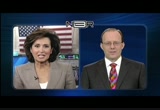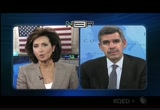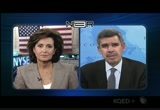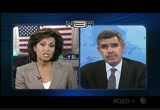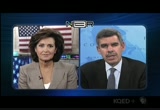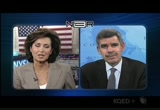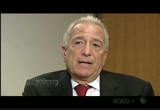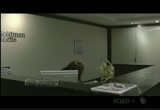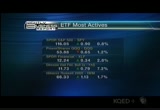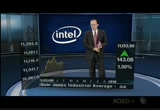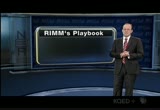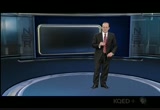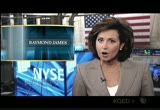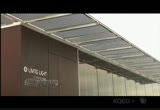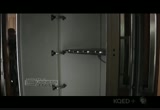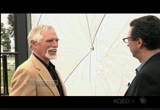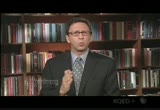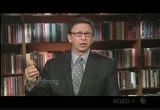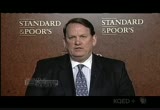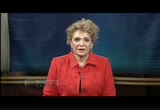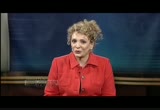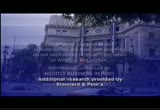tv Nightly Business Report PBS September 29, 2011 6:30pm-7:00pm PDT
6:30 pm
>> susie: europe's debt crisis is a step closer to getting more help. germany's parliament votes to beef up the region's bailout fund. we'll get reaction from the man who runs the world's biggest bond fund, mohamed el-erian. >> tom: the outlook for the u.s. economy brightens a bit. new data shows better than expected growth in the second quarter, thanks to an increase in consumer spending. it's "nightly business report" for thursday, september 29. this is "nightly business report" with susie gharib and tom hudson. "nightly business report" is made possible by:
6:31 pm
this program is made possible by contributions to your pbs station from viewers like you. thank you. captioning sponsored by wpbt >> susie: good evening, everyone. blue chip stocks finished higher today on optimism about the global economic picture, both here in the u.s. and in europe. tom, investors were encouraged that germany's parliament voted in favor of giving more financial support to europe's emergency bailout fund. >> tom: susie, investors were also upbeat about several strong reports on the u.s. economy. first, it turns out the u.s. economy was a bit stronger between april and june than first thought. the commerce department revised its gdp report, showing the
6:32 pm
economy expanded at annual rate of 1.3%. the previous estimate was 1%. then, we saw a drop in new filings for unemployment benefits. the labor department said unemployment benefits fell to a five-month low. 391,000 people filed last week, suggesting that layoffs are decreasing. the dow surged on those reports, rising as much as 260 points early on, finally closing up 143 points. the nasdaq lost ten and the s&p added nine. >> susie: most important today, investors everywhere were reassured that germany is now fully behind europe's rescue fund, the european financial stability facility, or the e.f.s.f. here's more on what it is and how it works. it's been called "le tarp"; the e.f.s.f. is europe's version of america's tarp bailout fund. it functions like a bank providing loans for troubled euro zone nations. of the 17 countries making contributions, france, germany
6:33 pm
and italy have put in the most money. it works like this-- a troubled country like greece applies for a loan. it negotiates terms with the european commission and the international monetary fund. then, the loan must be unanimously approved by the fund's members. the loans are not a handout; they must be paid back with interest. right now, the rescue fund is low on cash. it started out with $340 billion a year ago, but is tapped out after making loans to portugal and ireland. euro-zone countries are now voting to expand the fund to nearly $600 billion. many economists believe it needs at least $2 trillion to be effective. our guest tonight has been calling on european policymakers to take stronger and faster action to solve the debt crisis. he's mohamed el-erian, ceo of pimco, the world's largest bond fund. mohammed, nice to you have back. >> thank you, susie. >> susie: so let's talk a little bit about this fund.
6:34 pm
is it big enough to do its job to fix the european debt crisis? >> it's not big enough as yet. so europe is taking a two-step approach. number one, get all the parliaments to approve and number two, try to-- up the fund because you need a lot of money to stabilize sovereign debt and you need a lot of money to stabilize the banking system. so today was an important step, susie. but it's the first step in a pretty long journey sus now you have been critical about the way the policymakers have been handling the debt crisis, what should they be doing that they're not doing? >> two things. one is they should move quickly to stabilize the situation. and today's set is an important one. it's necessary but not sufficient so they got to get money into the system. and they've got to move quickly. second they've got to deal with greece in a more realistic fashion. no one believes that what greece is doing today is sustainable. so we need a new approach to
6:35 pm
greece. and third, they need to tell us what they're vision for the euro zone is going forward. physical we get these three things we're going to go from one uncertainty to another uncertainty with a bit of good news in between sus now even with if --. >> susie: if the europeans come together and follow the suggestions you are making, how long is it going to be before the european economy starts growing again, helping american businesses and u.s. markets? >> a long time, unfortunately. so a lot of damage has been created. we just did our assessment here at pimco and we think that next, for the next 12 months europe is going into recession. so europe will probably contract by 1% so we're not going to get help in the u.s.-- u.s. from europe. if anything europe will be a headwind for us economically. >> susie: let's talk about the u.s. economy. looking at the statistics that we just reported on, do you think that the u.s. economy is in better shape than we thought?
6:36 pm
>> so the good news is we grew at 1.3 instead of one. but the reality is we should be growing at 3% plus. so we are still way below potential, way below what we should be and that speaks to the structural impediment. we have problems with the hoss market with the labor market, with public finances, so we need to do a lot for more if we are to grow rapidly and if we are to lower unemployment. >> susie: is recession still on the worry list? could we, the u.s. slide into a recession three months, six months from now? >> it's a risk. i think that our own projection is the baseline, is about 0 to half a percent for the u.s. but like many other things, today, this baseline is subject to a lot of uncertainty. and unfortunately the balance of risk is on the downside. even the defense when they use that word significant
6:37 pm
before downside risk it's only the third time they do so. so even the fed is worried about the downside. >> susie: well, given this uncertain and very volatile climate, how are you investing for your pimco clients. are you buying u.s. treasuries now? are you buying stocks. are you in u.s. versus international. give us an idea of your strategy. >> do you remember last time we came on, i said don't underestimate the value of cash. it gives you a lot of optionality, the world is very uncertainty well. are very-- positioned. we think that this is a time where you worried about the return of your capitol and not the return on your capitol. so we invest in countries with very strong balance sheets when it comes to the bond side. on the equity side we are focused on multinationals that are attractively valued and importantly have high dividends as cushons and when it comes to corporate bonds, we are also focused
6:38 pm
on the strongest companies. this is a time to be cautious. this is a time to be patient because there's a lot of uncertainty and there will be better opportunities to take risks down the road. >> susie: you didn't mention u.s. treasuries, where do you stand on that in a few words? >> i think they belong in any portfolio among, with other government bonds. so they belong there as a stabilizer. but we don't see much scope for actually making money. this is more about capital preservation right now in the treasury segment. >> susie: a lot of good information to think about. thank you so much, always great having you on our program. >> thank you, susie. >> susie: we've been speaking with mohammed el-erian, c.e.o. of pimco. >> tom: the third quarter wraps up tomorrow, and what a three months it has been. from the debt ceiling showdown in washington to europe's financial crisis, stock investors have had plenty to chew on. one thing that's provided some solace for the frenetic market is the continued expectation for good third-quarter profits.
6:39 pm
but suzanne pratt reports earnings expectations have cooled in recent weeks. >> reporter: get ready for the stampede on wall street in the next few weeks. of course, we're talking about third-quarter corporate earnings, not cattle. the question is whether the news will be positive enough to make these animals happy and spark a rally in the stock market. investment strategist jim awad is worried about the increasingly negative tone from some of america's largest companies. >> i think the risks are on the downside. if the consensus conclusion from corporate america is that things are starting to get worse, that means that earnings estimates for next year are no good, and estimates will come down and stocks will go down. >> reporter: despite the economy's recent slowdown, wall street analysts still expect q3 results to be solid. the problem is those same experts are getting more pessimistic the closer we get to reporting season. s&p 500 firms are now expected
6:40 pm
to show a 13.6% increase in profits. on july 1, the number was 17%. earnings expert jharonne martis believes nine of the ten s&p sectors will show positive earnings growth, but forecasts are getting slashed in nearly all sectors of the economy. >> we are experiencing a big downward earnings revision throughout the board, across the board. and this is very unusual. usually, what we see is a steep decline in a particular company, but not across the board. >> reporter: and earnings expectations for financial firms like goldman sachs and bank of america keep getting worse. analysts say we'll be lucky to get a 5.8% increase in financial sector profits. on july 1, the forecasts were for a nearly 16% increase. but stock market pros says investors shouldn't be surprised by that bad news. >> the bank outlook here is really terrible in almost every department. but the stocks are down an awful lot, also.
6:41 pm
so, they're probably based on domestic earnings and the domestic situation down a lot and going to stay there, not go up. >> reporter: in case you're wondering about the fourth quarter, which gets underway next week, analysts are still expecting double-digit profit growth for the s&p 500. but that number has been falling, too. suzanne pratt, "nightly business report," new york. >> susie: and numbers are also falling in the housing market-- the number of contracts to purchase previously owned homes fell last month, another sign that lower prices and borrowing costs are doing little to increase demand. pending home sales were down more than 1% to the lowest level in four months. meanwhile, fixed mortgage rates have dropped to new historic lows and could drop even lower. the average on a 30-year fixed mortgage fell to 4% this week. that's the lowest rate on record since freddie mac began keeping track. and rates on 15-year fixed rate mortgages averaged 3.28%.
6:42 pm
6:43 pm
the major indices and some indecisiveness for investors. the dow industrial average traded in a 300 point range today, starting strong off the heels of the german approval of the latest european bailout fund. buyers lost enthusiasm into the 3:00 p.m. eastern time hour before pushing the index back into positive territory, ending with a 1.3% gain. intel was the dow's weakest stock, slipping just a fraction, but highlighting the weakness we saw today in technology generally, and specifically semiconductors. intel fell a half a percent. intel's chief competitor advanced micro devices sparked the drop in semiconductors, falling more than 13.5%. volume tripled as a-m-d late yesterday cut its outlook. the drop takes a-m-d down to a new 52-week low.
6:44 pm
a-m-d was the biggest loser among the s&p 500 companies today. netflix was another big loser, falling 11%. new competition may be coming as microsoft is looking to start an online pay television service with cable company comcast and internet provider verizon. bloomberg reports the new competition for the netflix streaming media service could be offered through microsoft's video game console, the x-box. those providing the new competition were mixed. microsoft and comcast shares fell, while verizon was up a fraction. a day after amazon announced its tablet computer, research in motion is trying to knock back some rumors and prices of its playbook tablet. first, rimm called an analyst claim that it has stopped making the playbook "pure fiction". and best buy cut its price for the playbook from $499 to $299 to better compete with amazon's new device. all the talk pushed research in motion shares down more than 3%. the stock took a dive in mid- september after reporting
6:45 pm
disappointing sales of its blackberry devices, as well as the playbook tablet. the stock sits near its recent 52 week low tonight. financial stocks led the gainers for the broad market. the top three dow stocks are in the finance sector-- travelers insurance, bank of america, and j.p. morgan each gained 3%. the financial buying extended to european banks. this exchange traded fund contains dozens of top european banks. spanish, german and french banking stocks were particularly strong. watch the cme group and mcgraw hill tomorrow. after the close, "the wall street journal" reported the two are in advance talks regarding the s&p index business owned by mcgraw hill. cme already owns the dow jones indexes business. cme was up 1% during the regular session while mcgraw stock was down almost 2%. but m-h-p rebounded 3% after this news. earlier this month, mcgraw said
6:46 pm
it would split into two companies-- its financial services business and its education unit. and that's tonight's "market focus." >> susie: if raymond james has been your broker, you might be getting a refund. regulators have ordered the investment firm pay back more than 15,000 clients who were charged excessive commissions. the financial industry regulatory authority, or finra, says raymond james will pay nearly $2 million for overcharging investors between the years 2006 and 2010. finra says the firm did not properly weigh the security type and transaction size in evaluating whether charges were appropriate. raymond james did not admit or deny wrongdoing, but said "it's pleased" the matter is resolved. >> tom: solar energy has had some dark days recently, thanks to solar panel maker solyndra filing for bankruptcy despite millions in government loan guarantees. still, solar innovations are shining at a design competition in washington, d.c. collegiate teams from around the world are showing off their
6:47 pm
solar innovations in the "solar decathalon." tonight, we continue our series "planet forward," a partnership with the george washington university social media project using your ideas to power our future. here's frank sesno. >> solar, solar, everywhere, designs from canada, ohio, new york, the cylindrical panels atop the university of tennessee house are different, up to 20% more efficient than the old-fashioned counterparts they say, bifacial on appalachan state home generate power from both sides. you're a home builder. dow this sort of thing for a living. bi facial solar panels here, cylindrical over there, what is the most innovative idea you have seen on the rooftop. >> it would be a toss up. i really like what i see. i think the bottom line comes down to what it will cost to actually put them on a house.
6:48 pm
>> and cost is partly determined by tax breaks and government goodies, vulnerable to budget cuts. >> you are a home builder, involved in all kinds of energy efficiencies. these solar panels, can they happen without government subsidies because those are under attack. >> that step to get up there without some kind of subsidy is just almost never going to happen. >> but take heart, innovations go inside too. in perdue's in home this a tachbs to the air conditioner and filters air as it cycles through, in new zealand's first light house a drawing cover circulates wrm water, and dry hair pumped through pipes to dry laundry and a salty water fall in the university of maryland watershed home pulls humidity out of the air. >> if i open this we see how it works. so we've got the water coming down from a bank. >> right. >> a pump system here, through these -- >> spacers just allow it all to come throughance and lithium chloride -- >> at that point it is like a salt in a salt shaker, it
6:49 pm
will store moisture. >> so my air conditioner doesn't have to work as hard and i don't sweat as much and pay add much and i smile more. >> that's right. >> another innovation, the exterior. welcome to chip, from california. a flexible vinyl membrane surrounds the whole house. >> so what do you think as i builder about put approximating the insulation on the outside? >> well, i think the actual thought process, you know, you don't have any thermal shorts in your studs, you get it all out there. >> no holes. >> it's like a jacket. it's covered me completely and at that point you don't have plugs going through, just a minimum of windows and a door. i think it's a great concept. it's just the durability that i would question. >> why is that the question. >> building officials are going to say what is that? you know. and it's that time you have to convince them that it's going it to meet the requirements of exterior durability that is in the code. >> the sun will soon set on the solar decathalon then the test will be which of these innovations will live in the real world.
6:50 pm
>> frank ses know joins us from our-- ses know joins us from our bureau in washington. lots of great techniques but they're entering a difficult housing market. are construction workers, is the industry prepared to work with these products? >> this is dreamovision out there and in a lot of cases some of their technology exceeds what can be done right now. in other cases some of the renovations and kinds of green energy you could bring in your house, you will not find the work for. -- force, one area we know is growing is solar despite the setbacks you pointed out earlier. but this is a workforce and entire technology sector in transition. >> you mentioned some of the tax credits during your tour of the decathalon. many of these are really very rich in tax credits for the homeowner and builder. if those credits go away, how about the acceptance of the technology. >> real problem. that is really the problem right now, in the district of columbia, in the state of maryland and other states, even with the federal government now we see these budgets under siege so some of the tax credits that have been available, if you put
6:51 pm
solar on your roof, and other energy savings on your house, are either going away or being reduced. that makes those products more expensive. and they're expensive products anyway. that is really the big question mark, the cloud hanging in front of the sun for these and other technology. >> it can't be cheap to wrap your house in insulation on the outside. >> i don't know anybody that is going to do that any time soon. >> is anybody going to live in these homes that are part of the decathalon. >> yes, that is the great part. one of the homes is going to habitat of humanity. a family has been selected and and susly -- anxiously looking to move into it one of the colleges in vermont will make it student housing, the tennessee home are going go on tour around the state. the new zealand house has been bought by a private individual. they're not big, 12, 1400 square feet is all, so it's kind of cozy but people will be living in these. >> you can check out and vote for your favorite, go to our web site nbr@pbs.org. go to the planet forward link, you can like your
6:52 pm
favorite team and we will feature the winner right here next month. frank ses know with us from washington with planet forward. thanks, frank. >> thanks, tom. >> susie: here's what we're watching for tomorrow: the university of michigan issues its final take on consumer sentiment for september. we'll ask legendary investor warren buffett for his take on the economy and the markets, and we wrap up wall street's third quarter with standard and poor's strategist sam stovall. he's our friday "market monitor" guest. a japanese auto supplier has agreed to plead guilty and pay a $200 million fine to settle a criminal price-fixing scam that ran partly out of detroit. the settlement was announced today by the u.s. department of justice. three furukawa executives have also agreed to plead guilty and serve prison time in the u.s. ranging from 12 to 18 months. it's the government's first charges as a result of its ongoing international investigation of price fixing in the auto parts industry.
6:53 pm
>> tom: a group of privacy advocates wants uncle sam to investigate facebook. the american civil liberties union and the electronic privacy information center are among the nine groups asking the federal trade commission to look into how the social networking giant collects data about its users' online activities. the groups are worried recent changes to the site give facebook far greater ability to share users' personal information with businesses.
6:54 pm
>> susie: many teens have been back to school for about a month now. while they deal with their academics, many also work after school and on weekends to earn extra money. in tonight's "kids and cash," the benefits and drawbacks of having a job as a teenager. here's neale godfrey, c.e.o. of the children's financial network. >> in some families, there's not an economic choice-- many teens work after school or during the summer because they must. i'm an advocate of teens working. however, you need to help your children balance work and school and time off. beyond that, i don't believe it's a good idea for a teen to work during the school year. a summer job, however, is a good thing. a good job for teens is one where they will learn something of value. often, some of the best jobs are ones that pay nothing. i'm referring, of course, to volunteer jobs. they frequently involve a lot more responsibility and provide
6:55 pm
a chance to really make a difference. kids who want to make this kind of positive impact on society deserve our support. perhaps consider a stipend that's half of what they could make at their volunteer job. be involved with your teen in choosing a job, but be careful not to take on responsibility that should be theirs. discuss safety, training, location and schedules. have your teen do the research to ensure they've picked the right job for themselves and time that they have available to work. but remember, school comes first. i'm neale godfrey. >> tom: that's "nightly business report" for thursday, september 29. i'm tom hudson. good night, everyone, and good night to you, too, susie. >> susie: good night, tom. i'm susie gharib. good night, everyone. we hope to see all of you again tomorrow night. "nightly business report" is made possible by:
6:56 pm
this program is made possible by contributions to your pbs station from viewers like you. thank you. captioning sponsored by wpbt captioned by media access group at wgbh access.wgbh.org >> more information about investing is available in: to order this dvd, call 1-800- play-pbs or visit online at shoppbs.org. >> be more. pbs.
146 Views
Uploaded by TV Archive on

 Live Music Archive
Live Music Archive Librivox Free Audio
Librivox Free Audio Metropolitan Museum
Metropolitan Museum Cleveland Museum of Art
Cleveland Museum of Art Internet Arcade
Internet Arcade Console Living Room
Console Living Room Books to Borrow
Books to Borrow Open Library
Open Library TV News
TV News Understanding 9/11
Understanding 9/11
